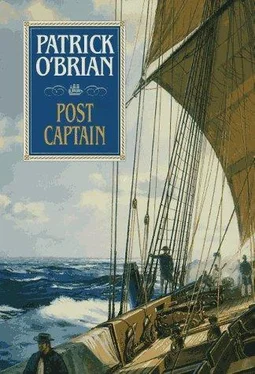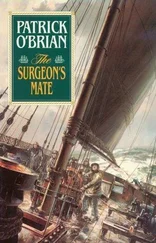Patrick O'Brian - Post captain
Здесь есть возможность читать онлайн «Patrick O'Brian - Post captain» весь текст электронной книги совершенно бесплатно (целиком полную версию без сокращений). В некоторых случаях можно слушать аудио, скачать через торрент в формате fb2 и присутствует краткое содержание. Жанр: Книги. Описание произведения, (предисловие) а так же отзывы посетителей доступны на портале библиотеки ЛибКат.
- Название:Post captain
- Автор:
- Жанр:
- Год:неизвестен
- ISBN:нет данных
- Рейтинг книги:5 / 5. Голосов: 1
-
Избранное:Добавить в избранное
- Отзывы:
-
Ваша оценка:
- 100
- 1
- 2
- 3
- 4
- 5
Post captain: краткое содержание, описание и аннотация
Предлагаем к чтению аннотацию, описание, краткое содержание или предисловие (зависит от того, что написал сам автор книги «Post captain»). Если вы не нашли необходимую информацию о книге — напишите в комментариях, мы постараемся отыскать её.
Post captain — читать онлайн бесплатно полную книгу (весь текст) целиком
Ниже представлен текст книги, разбитый по страницам. Система сохранения места последней прочитанной страницы, позволяет с удобством читать онлайн бесплатно книгу «Post captain», без необходимости каждый раз заново искать на чём Вы остановились. Поставьте закладку, и сможете в любой момент перейти на страницу, на которой закончили чтение.
Интервал:
Закладка:
‘Was you very ill, sir?’ asked Miss Lamb respectfully.
‘I believe I must have been,’ said jack, ‘for they shaved my head, clapped on their leeches twice a day, and made me drink warm goat’s milk whenever I came to my senses; and by the time it was over I was so weak that I could scarcely sit my horse - we rode no more than fifteen or twenty miles a day for the first week.’
‘How fortunate you were travelling with dear Dr Maturin,’ said Miss Susan. ‘I truly dote upon that man.’
‘I have no doubt he pulled me through - quite lost, but for him,’ said Jack. ‘Always there, ready to bleed or dose me, night and day. Lord, such doses! I dare say I swallowed a moderate-sized apothecary’s shop - Stephen, I was just telling Miss Susan how you tried to poison me with your experimental brews.’
‘Do not believe him, Dr Maturin. He has been telling us how you certainly saved his life. We are so grateful; he has taught us to knot laniards and to splice our wool.’
‘Aye?’ said Stephen. ‘I am looking for the captain.’ He peered inquisitively under the empty chair. ‘I have news that will interest him; it is of interest to us all. The Lascars are suffering not from the buldoo-panee of their own miasmatic plains, whatever Mr Parley may maintain, but from the Spanish influenza! It is whimsical enough to reflect that we, in our haste, should be the cause of our own delay, is it not? For with so few hands we shall no doubt see our topsails handed presently.’
‘I am in no hurry. I wish this voyage would go on for ever,’ said Miss Lamb, arousing an echo in her sister alone.
‘Is it catching?’ asked Jack.
‘Oh, eminently so, my dear,’ said Stephen. ‘I dare say it will sweep the ship in the next few days. But I shall dose them; oh, I shall dose them! Young ladies, I desire you will take physic tonight: I have made up a comfortable little prophylactic bottle for you both, and
another, of greater strength, for Major Hill. A whale!
A whale!’
‘Where away?’ cried Mr Johnstone, the first officer. He had been in the Greenland fishery when he was young, and his whole being responded to the cry. He had no answer, for Dr Maturin was squatting like a baboon, resting a telescope on the rail and training it with concentrated diligence upon the heaving sea between the ship and the horizon; but directing his gaze along the tube and staring under his two hands cupped Mr Johnstone presently saw the distant spout, followed by the hint of an immense slow roll; gleaming black against the grey.
‘Och, she’s no good to you at all,’ he said, relaxing. ‘A finwhale.’
‘Could you really see its fins that great way off?’ cried Miss Susan. ‘How wonderful sailors are! But why is it no good, Mr Johnstone? Not quite wholesome, perhaps, like oysters without an R?’
‘There she blows!’ cried Mr Johnstone, but in a detached, academic voice, from mere habit. ‘Another one. See the spout, Miss Susan. Just a single fountain-jet: that means a finner - your right-whale shows two. Aye, aye, there she goes again. There must be a fair-sized pod. No good to man or beast. It vexes my heart to think of all that prime oil swimming there, no good to man or beast.’
‘But why is the whale no good?’ asked Miss Lamb.
‘Why, because she is a finwhale, to be sure.’
‘My sister means, what is wrong with being a finwhale? Do you not, Lucy?’
‘The finner is too hugeous, ma’am. If you are so rash as to make an attempt upon her - if you creep up in the whale-boat and strike your harpoon home, she will bash the boat like a bowl of neeps as she sounds, maybe, and in any case she will run out your two-hundred-fathom whale-line in less than a minute - you bend on another as quick as you can - she runs it out - another, and still she runs. She tows you under, or she carries all away:
you lose your line or your life or both. Which is as who should say, be humble, flee ambition. Canst thou draw up Leviathan with a hook? Confine thyself to the right-whale, thy lawful prey.’
‘Oh, I will, Mr Johnstone,’ cried Miss Lamb. ‘I promise you I shall never attack a finwhale all my life.’
Jack liked to see a whale - amiable creatures - but he could tear himself away from them more easily than either Stephen or the person at the mast-head who was supposed to be looking-out, and for some time now he had been watching the white fleck of sails against the darkening westward sky. A ship, he decided at last: a ship under easy sail on the opposite tack.
A ship she was, the Bellone, a Bordeaux privateer, one of the most beautiful to sail from that port, high and light as a swan, yet stiff; a thirty-four-gun ship-rigged privateer with a clean bottom, a new set of sails and two hundred and sixty men aboard. A fair proportion of those sharp-eyed mariners were at present in the tops or at the crowded mast-heads, and although they could not exactly make the Lord Nelson out, they could see enough to make Captain Dumanoir edge cautiously down for a closer look in the failing light.
What he saw was a twenty-six-gun ship, that was certain; probably a man-of-war, but if so then a partially disabled man-of-war, or her topgallantmasts would never have been down on deck in such a breeze. And as Dumanoir and his second captain gazed and pondered in the main crosstrees all notion of the Lord Nelson’s being a man-of-war gradually left them. They were old-experienced sailors; they had seen much of the Royal Navy in the last ten years; and there was something about the Lord Nelson’s progress that did not square with their experience.
‘She’s an Indiaman,’ said Captain Dumanoir, and although he was only three parts convinced his heart began to thump and his arm to tremble; he hooked it round the topgallant shrouds and repeated, ‘An Indiaman.’ Short of a Spanish galleon or treasure-ship, a British Indiaman was the richest prize the sea could offer.
A hundred little details confirmed his judgment; yet he might be wrong; he might be leading his precious Bellone into an action with one of those stubby English sixth-rates that carried twenty-four-pounder carronades, the genuine smashers, served by a numerous, well-trained, bloody-minded crew; and although Captain Dumanoir had no sort of objection to a dust-up with any vessel roughly his own size, King’s ship or not, he was primarily a commerce destroyer; his function was to provide his owners with a profit, not to cover himself with glory.
He regained his quarterdeck, took one or two turns, glancing up at the western sky. ‘Dowse the lights one by one,’ he said. ‘And in fifteen minutes’ time put her about. Courses and foretopsail alone. Matthieu, Jean-Paul, Petit-Andre, up you go: let them be relieved every glass, Monsieur Vincent.’ The Bellone was one of the few French ships of the time in which these orders, together with others concerning the preparation of the guns and small-arms, were received without comment and exactly obeyed.
So exactly that even before the lightening of the day the look-out on the Lord Nelson’s forecastle felt the loom of a ship to the windward, a ship sailing on a parallel course and not much above a mile away. What he could not see was that the ship was cleared for action - guns run out, shot-racks charged, cartridge filled and waiting, small arms served out, splinter-netting rigged, yards puddened, boats towing astern - but he did not like her proximity, nor the lack of lights, and when he had stared awhile, wiping his streaming eyes, he hailed the quarterdeck: between his sneezes he gave Mr Pullings to understand that there was a vessel on the larboard beam.
Pullings’ mind, lulled by the long even send of the sea, the regular hum of the rigging, the warmth of his pilot-jacket and blackguardly wool hat, exploded into sharp awareness. He was out of his corner by the binnacle, half-way up the weather shrouds, before the sneezing had stopped: three seconds for a long hard stare, and he turned up the watch with the roar he had learnt aboard HMS Sophie. The boarding-netting was already rigging out on the long iron cranes by the time he had shaken Captain Spottiswood into full wakefulness - orders confirmed, beat to action, clear the decks, run out the guns, women down into the hold.
Читать дальшеИнтервал:
Закладка:
Похожие книги на «Post captain»
Представляем Вашему вниманию похожие книги на «Post captain» списком для выбора. Мы отобрали схожую по названию и смыслу литературу в надежде предоставить читателям больше вариантов отыскать новые, интересные, ещё непрочитанные произведения.
Обсуждение, отзывы о книге «Post captain» и просто собственные мнения читателей. Оставьте ваши комментарии, напишите, что Вы думаете о произведении, его смысле или главных героях. Укажите что конкретно понравилось, а что нет, и почему Вы так считаете.












